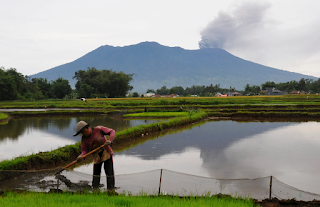Navigating Climate Frontiers: Asia's Battle and Hope Amidst Record Warmth
In the throes of the warmest year on record, Asia confronted a myriad of climate-related challenges in 2023. Extreme heatwaves, disrupted weather patterns, and environmental crises marked the year's narrative.
From the rice price crisis fueled by climate-induced disruptions to the rise of electric vehicles as a positive step towards sustainability, the region experienced a complex interplay of adversities and aspirations. Wastewater concerns from Fukushima, the looming plastic pollution crisis, and the impact on fisheries underscored the urgent need for collective action.
Despite controversies and challenges, the year ended with a glimmer of hope at Cop28, where nations acknowledged the imperative to transition away from fossil fuels. As Asia grapples with the consequences of climate change, the coming year holds the promise of decisive global efforts to address the climate crisis.
As Asia grappled with scorching heatwaves and environmental challenges in 2023, marked as the warmest year ever recorded, This Week in Asia covered key environmental stories that underscored the region's vulnerabilities and aspirations for a sustainable future.
Frequently Asked Questions (FAQ)
Q1: What were the major climate-related challenges faced by Asia in 2023? A1: Asia encountered extreme weather events, including scorching heatwaves and disruptive El Niño conditions, leading to a rice price crisis. The region also navigated concerns over wastewater from Fukushima, the rise of electric vehicles (EVs), plastic pollution, and the impact of climate change on fisheries.
Q2: How did climate change affect rice production in Asia, and what were the consequences? A2: Climate change-induced extreme weather, influenced by El Niño conditions, disrupted rice production in Asia. This led to a surge in rice prices, with India, the top rice exporter, imposing restrictions on shipments, causing a ripple effect on food inflation and central bank policies.
Q3: What positive developments were observed in the context of climate change mitigation in Asia? A3: Southeast Asian nations embraced the production of electric vehicles (EVs) as a move towards reducing dependency on imported fossil fuels and fulfilling net-zero carbon pledges.
Q4: What were the environmental concerns and controversies in Japan, particularly regarding Fukushima waste water? A4: Japan's plans to release Fukushima waste water sparked environmental safety concerns in mainland China and Hong Kong, impacting Japanese food exports. Despite controversies, nations in the region, including China, continued to explore nuclear energy as an alternative to fossil fuels.
Q5: What global initiatives were discussed to address plastic waste, and how does Asia contribute to the issue? A5: World leaders are progressing toward a plastic-waste treaty to combat pollution and encourage a circular economy. Asia, particularly Hong Kong, South Korea, and mainland China, plays a significant role in global plastic production.
Q6: How has climate change impacted fisheries in Thailand, specifically the pla tu mackerel? A6: Climate change, pollution, and overfishing have threatened Thailand's favorite fish, the pla tu mackerel, affecting marine ecosystems and fish numbers.
Q7: What key outcomes emerged from the United Nations climate conference in Dubai, Cop28? A7: Cop28 signaled a collective acknowledgment of the need to transition away from fossil fuels to combat climate change. However, no specific timelines or financial mechanisms for the phase-out were announced.
#AsiaClimateJourney, #ClimateChangeChallenges, #SustainableFuture, #Cop28Outcomes, #GlobalClimateAction

